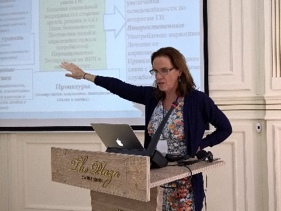 Louisa Gilbert, Ph.D. (lg123@columbia.edu) is a licensed social worker with 25 years of experience developing, implementing and testing multi-level interventions to address HIV/AIDS, substance abuse, trauma, partner violence and other co-occurring issues among vulnerable communities in the U.S. and Central Asia. She has served as the Co-Director of the Social Intervention Group since 1999 and the Co-Director of the Global Health Research Center of Central Asia since 2007. Her specific area of research interest has concentrated on advancing a continuum of evidence-based interventions to prevent intimate partner violence among drug-involved women and women in the criminal justice system. More recently, her funded research has also focused on identifying and addressing structural and organizational barriers in harm reduction programs to implementing evidence-based interventions to prevent overdose among drug users in Central Asia.
Louisa Gilbert, Ph.D. (lg123@columbia.edu) is a licensed social worker with 25 years of experience developing, implementing and testing multi-level interventions to address HIV/AIDS, substance abuse, trauma, partner violence and other co-occurring issues among vulnerable communities in the U.S. and Central Asia. She has served as the Co-Director of the Social Intervention Group since 1999 and the Co-Director of the Global Health Research Center of Central Asia since 2007. Her specific area of research interest has concentrated on advancing a continuum of evidence-based interventions to prevent intimate partner violence among drug-involved women and women in the criminal justice system. More recently, her funded research has also focused on identifying and addressing structural and organizational barriers in harm reduction programs to implementing evidence-based interventions to prevent overdose among drug users in Central Asia.
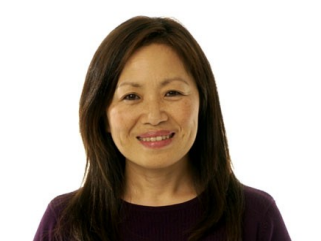 Tazuko Shibusawa, Associate Professor of Social Work, MSW, Ph.D., LCSW (tazuko.shibusawa@nyu.edu) Tazuko Shibusawa received her master’s and doctoral degrees from the University of California, Los Angeles. Dr. Shibusawa’s research, which has been funded by the National Institute of Drug Abuse and the John A. Hartford Foundation Geriatric Social Work Faculty Scholars Program, focuses on the health and mental health of older adults and their families, including women who are at risk for mistreatment and abuse, and older adults who struggle with substance abuse. Dr. Shibusawa teaches in the MSW and doctoral programs in the area of advanced clinical practice and previously served as Associate Dean and Director of the MSW Program at Silver and Co-Director of the Global MSW Program in Shanghai & New York. Dr. Shibusawa has also been closely involved in integrating new media technology in the teaching and learning of social work practice. Dr. Shibusawa’s previous clinical and administrative experiences include Director of Social Services, Keiro Nursing Home in Los Angeles, California; psychiatric social worker, Los Angeles County Department of Mental Health, Asian Pacific Counseling & Treatment Center; co-director of Counseling International in Tokyo, Japan; and mental health consultant for the World Health Organization. Dr. Shibusawa received post-graduate training in the areas of family therapy, psychoanalytically-oriented psychotherapy, trauma studies, and mindfulness-based psychotherapies. Dr. Shibusawa also teaches summer intensives in Tokyo, Japan.
Tazuko Shibusawa, Associate Professor of Social Work, MSW, Ph.D., LCSW (tazuko.shibusawa@nyu.edu) Tazuko Shibusawa received her master’s and doctoral degrees from the University of California, Los Angeles. Dr. Shibusawa’s research, which has been funded by the National Institute of Drug Abuse and the John A. Hartford Foundation Geriatric Social Work Faculty Scholars Program, focuses on the health and mental health of older adults and their families, including women who are at risk for mistreatment and abuse, and older adults who struggle with substance abuse. Dr. Shibusawa teaches in the MSW and doctoral programs in the area of advanced clinical practice and previously served as Associate Dean and Director of the MSW Program at Silver and Co-Director of the Global MSW Program in Shanghai & New York. Dr. Shibusawa has also been closely involved in integrating new media technology in the teaching and learning of social work practice. Dr. Shibusawa’s previous clinical and administrative experiences include Director of Social Services, Keiro Nursing Home in Los Angeles, California; psychiatric social worker, Los Angeles County Department of Mental Health, Asian Pacific Counseling & Treatment Center; co-director of Counseling International in Tokyo, Japan; and mental health consultant for the World Health Organization. Dr. Shibusawa received post-graduate training in the areas of family therapy, psychoanalytically-oriented psychotherapy, trauma studies, and mindfulness-based psychotherapies. Dr. Shibusawa also teaches summer intensives in Tokyo, Japan.
 Julia Rozanova, Associate Research Scientist, Ph.D. (julia.rozanova@yale.edu) Julia Rozanova is a medical sociologist. She received her doctoral degree from the University of Alberta, and has been a research faculty with the Department of Infectious Diseases at the Yale School of Medicine since 2015. Her early publications included critique of successful ageing and polarized ageism, particularly in the media portrayals of later life. Her consequent work focused on polarized ageism in the context of new HIV diagnoses among older adults in Ukraine. Currently she studies health behaviors and ways in which people and groups marginalized through their medical diagnosis, may disengage from healthcare in pursuit of what they perceive as “normal life”, on examples of incarcerated persons with a history of injection drug use in Eastern Europe and Central Asia, and veterans with mental health problems in the United States. She has conducted qualitative interviews with incarcerated persons in Kyrgyzstan about HIV risks and currently is developing a clinical trial of a peer-driven intervention to reduce HIV risk in prisons. Her work has been funded by the Killam Foundation, Canadian Institutes for Health Research, Social Sciences and Humanities Research Council of Canada, Yale’s Center for Interdisciplinary Research of AIDS, and American Medical Foundation.
Julia Rozanova, Associate Research Scientist, Ph.D. (julia.rozanova@yale.edu) Julia Rozanova is a medical sociologist. She received her doctoral degree from the University of Alberta, and has been a research faculty with the Department of Infectious Diseases at the Yale School of Medicine since 2015. Her early publications included critique of successful ageing and polarized ageism, particularly in the media portrayals of later life. Her consequent work focused on polarized ageism in the context of new HIV diagnoses among older adults in Ukraine. Currently she studies health behaviors and ways in which people and groups marginalized through their medical diagnosis, may disengage from healthcare in pursuit of what they perceive as “normal life”, on examples of incarcerated persons with a history of injection drug use in Eastern Europe and Central Asia, and veterans with mental health problems in the United States. She has conducted qualitative interviews with incarcerated persons in Kyrgyzstan about HIV risks and currently is developing a clinical trial of a peer-driven intervention to reduce HIV risk in prisons. Her work has been funded by the Killam Foundation, Canadian Institutes for Health Research, Social Sciences and Humanities Research Council of Canada, Yale’s Center for Interdisciplinary Research of AIDS, and American Medical Foundation.
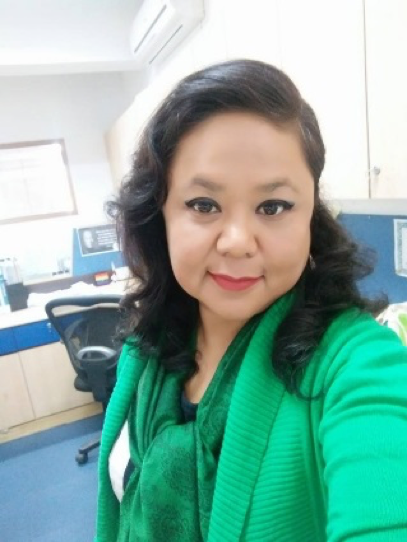
Pemu Doma Bhutia (pemudoma@gmail.com) is a community development worker with more than 10 years of experience working in the field of HIV/AIDS and its related challenges. She has vast experience working with and for Key Populations (KPs) most affected by HIV/AIDS in the Asia Pacific region. Her area of work has been program and partnership management, Resource mobilisation/fund raising for KP NGOs and CBOs, Donor relations, capacity building of KPs for effective response towards HIV/AIDS prevention, treatment care and support. She is also Master trainer on Stepping Stones (UGANDA) module related to HIV/AIDS and Gender and the WINGS SBIRT module on GBV and IPV. After successful piloting the Project PANKH (stands for WINGS in Marathi), Pemu coordinates the WINGS Phase II multi-site project that focuses on GBV prevention in FIDUs and WUDs. In the past she has worked with international organisations like VSO UK, TSF South Asia UNAIDS. She also has hands on experience on facilitating workshops/trainings of Global Fund Risk management and PR management Dashboard. Pemu is currently working in Technical Support Hub at India HIV/AIDS Alliance as a Senior Officer for the Asia Pacific Region based in India.
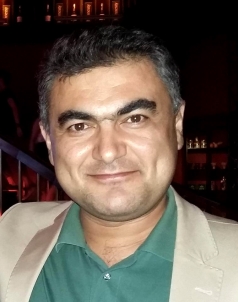
Dr. Azizbek Boltaev, M.D. (azizbekboltaev@inson.org) is a psychiatrist with more than 17 years of clinical and research experience in the field of addiction medicine, mental health and HIV. Dr. Boltaev holds a position as director of Human Research and Development Center in Bukhara, Uzbekistan. He successfully participated in the development and management of programs aimed at treating people who use drugs in Central Asia and Eastern Europe. As an advisor to UKAID and PEPFAR-funded programs he was actively engaged in initiation and scaling up opioid substitution therapy in Kazakhstan, Kyrgyzstan and Tajikistan. Dr. Boltaev served in technical expert roles for various international bodies including assignments as a core member of the UN Theme Group on injecting drug use (Austria), a member of the Steering Committee of the Eurasian Harm Reduction Network (Lithuania), an expert for the Technical Review Panel of the Global Fund to fight AIDS, TB and Malaria (Switzerland). He regularly consults WHO, UNODC, USAID and CDC.
Azizbek Boltaev continues his daily clinical practice in Bukhara and sees patients with mental and substance misuse disorders.
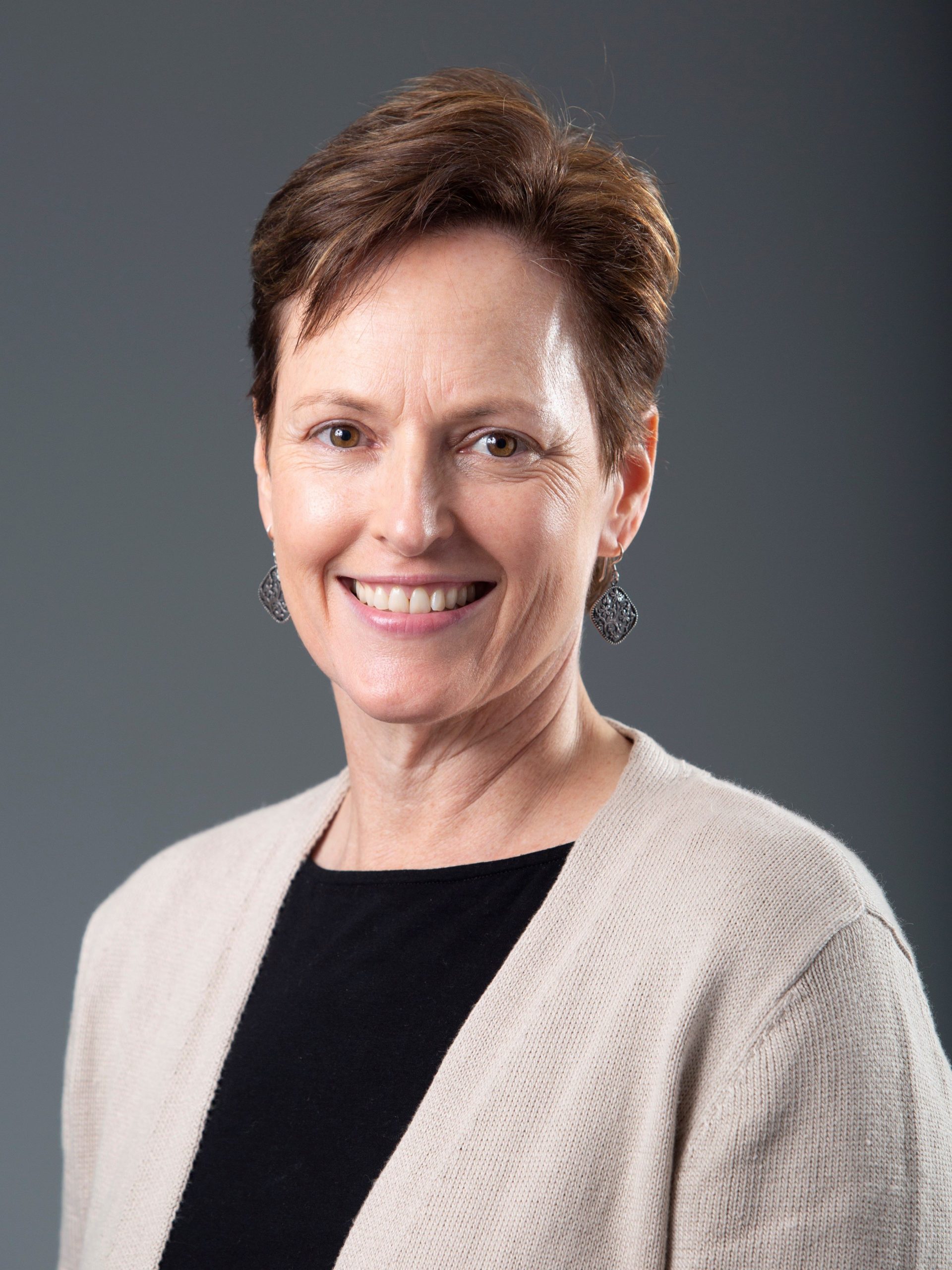
Anne Malin, Ph.D. Dr. Malin has worked in the global health field for over twenty years including research, teaching, and program implementation. Dr. Malin previously worked with the team at the Columbia University’s Global Health Research Center of Central Asia (GHRCCA) and related research projects included Principal Investigator on two NIH National Institute of Drug Abuse research studies with at-risk populations. It was through this work that Dr. Malin connected with the GLORI Foundation and collaborations have included programming focused on caregiver support.
In Kosovo, Dr. Malin was a US Fulbright Scholar teaching a university-level course in the Psychology Department and conducting research on the impact of substance use on families. Additionally, Dr. Malin worked in Kosovo as a Project Manager for a USAID funded NGO HIV prevention project, and as a WHO consultant for a report on substance use. Dr. Malin is presently working as a clinical social worker focusing on areas of trauma and traumatic stress, palliative care, and resiliency.
 Timothy Hunt, Ph.D (th2258@columbia.edu) is Director of Training and Capacity Building for Columbia University School of Social Work’s Social Intervention Group (SIG), the Global Health Research Center of Central Asia (GHRCCA), and former executive director for Middle East and Gulf projects for CSSW where he has provided extensive leadership for health and social service organizations in the adaption and integration of evidence-based strategies and research methods both in the US and internationally.
Timothy Hunt, Ph.D (th2258@columbia.edu) is Director of Training and Capacity Building for Columbia University School of Social Work’s Social Intervention Group (SIG), the Global Health Research Center of Central Asia (GHRCCA), and former executive director for Middle East and Gulf projects for CSSW where he has provided extensive leadership for health and social service organizations in the adaption and integration of evidence-based strategies and research methods both in the US and internationally.
Tim brings over 26 years of clinical experience as a family/couples’ therapist, licensed clinical social worker, and addiction specialist to the project and has personally trained over 9,000 healthcare staff.
Dr. Hunt has also developed and disseminated curriculum and technical assistance in three Central Asian nations to build medical and social service staff capacity to engage high risk populations while enhancing adherence to treatment and care, and preventing overdose funded by the Centers for Disease Control and Prevention (CDC) and USAID.
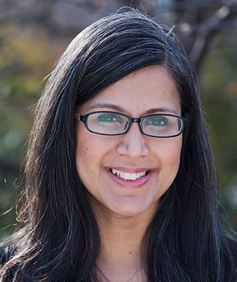 Tina Jiwatram-Negrón, Ph.D (tjiwatra@asu.edu) is the Assistant Professor in School of Social Work at Arizona State University. Her research and teaching focuses on different intersections of gender-based violence, including HIV and HIV risk behaviors (sex work, substance use), and related trauma/mental health outcomes. She specializes in intervention research among individuals and couples in these specific topical areas, both domestically and internationally, with emphasis on low-resource settings. Previously, she served as a Project Director at the Columbia University Social Intervention Group and Global Health Research Center of Central Asia on multiple HIV risk reduction and gender-based violence prevention intervention projects.
Tina Jiwatram-Negrón, Ph.D (tjiwatra@asu.edu) is the Assistant Professor in School of Social Work at Arizona State University. Her research and teaching focuses on different intersections of gender-based violence, including HIV and HIV risk behaviors (sex work, substance use), and related trauma/mental health outcomes. She specializes in intervention research among individuals and couples in these specific topical areas, both domestically and internationally, with emphasis on low-resource settings. Previously, she served as a Project Director at the Columbia University Social Intervention Group and Global Health Research Center of Central Asia on multiple HIV risk reduction and gender-based violence prevention intervention projects.
Also thoroughly grounded in the non-profit sector for over a decade, Dr. Jiwatram-Negrón previously worked at multiple community mental health and domestic violence non-profits within the U.S., and was recently identified a Gender Expert by the United Nations.
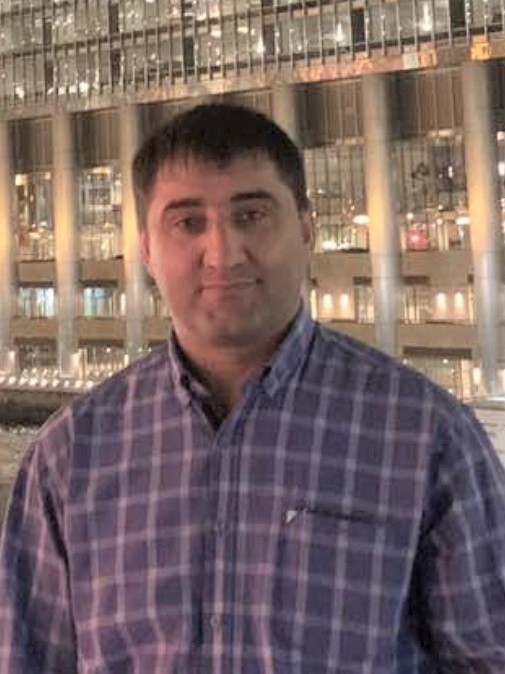 Jonbek Jonbekov (jonbek@mail.ru) is a researcher and Program Coordinator at PRISMA Research Center, Tajikistan.
Jonbek Jonbekov (jonbek@mail.ru) is a researcher and Program Coordinator at PRISMA Research Center, Tajikistan.
As a program coordinator he worked in implementation of following projects in collaboration with University of Illinois at Chicago: 1) “Migrancy, Masculinity, and Preventing HIV in Tajik Male Migrant Workers (R01)”; 2) “Labor Migration and Multilevel HIV Prevention (K24)”; 3) “Addressing Mental Illness and Physical Comorbidities in Migrants and Their Families”; 4) “Advancing Stepped Care for Women’s Mental Health disorders in and LMIC”; 5) “MASLIHAT Intervention for Tajik Male Migrant IDUs”. In collaboration with Columbia University, NY, USA: 6) Qualitative Feasibility Study: Tajikistan-Afghanistan Cross-Border HIV and STI Prevention: Formative Study, 7) Tuberculosis Risk Factors Among Central Asian Migrants From Kyrgyzstan &Tajikistan.
In collaboration with UNODC and WHO: 8) Multisite implementation study on community management of opioid overdose including the use of naloxone for preventing overdose deaths (S-O-S Study).
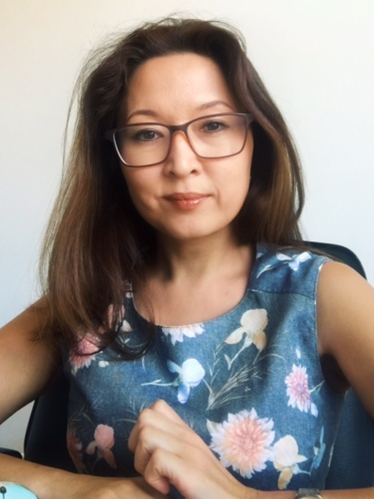
Assel Terlikbayeva, MD, M.S.W. (assel.terlikbayeva@ghrcca.org) is the Regional Director of the Global Health Research Center of Central Asia (GHRCCA) in Kazakhstan since 2007. Her research interests have focused on behavioral interventions related to HIV, TB, STIs, substance use and mental health in Central Asia. Currently, she is leading three large RO1s in Kazakhstan focusing on linkage to HIV care and improving HIV treatment outcomes among three key population groups: injection drug users, sex workers, and men who have sex with men (MSM). In previous years, GHRCCA has completed several NIH-funded grants focused on HIV among injection drug users and migrants, including an R01 focused on adapting a couple-based HIV risk reduction intervention for people who inject drugs. Over the past 10 years, she has implemented substance use and HIV/STI prevention and intervention studies in Kazakhstan and created strong community partnerships, established close cooperation with governmental agencies, and trained and supervised local research teams in recruitment and retention of research participants. Dr. Terlikbayeva received her MD from the Almaty Medical University in 2001 and Master of Science in Social Work from Columbia University School of Social Work in 2003.

















